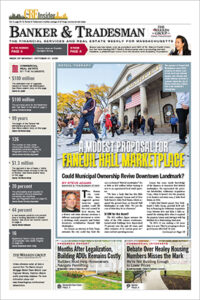It’s been almost four months since the Office of the Comptroller of the Currency (OCC) took responsibility for regulating banks formerly looked after by the Office of Thrift Supervision (OTS), and it may still be too early to judge the move’s efficacy.
Shortly after the transition was officially made in late July, Massachusetts Division of Banks officials said they were concerned about whether the OCC – which as a regulator had no prior experience overseeing mutual banks – could smoothly transition to governing small, mutual institutions.
Several industry executives told Banker & Tradesman that President Barack Obama’s nominee to run the OCC, Thomas Curry, was a good choice. The former head of the Massachusetts Division of Banks has a reputation for supporting community banks.
Still, a Boston banking attorney told Banker & Tradesman the transition could be like “a cold shower” for some banks.
For its part, the OCC says the fact that it took on many of the bank examiners formerly at the OTS, combined with its detailed outreach efforts, should keep any difficulties from becoming too serious.
Lost In Transition
The OCC’s New York-based Northeastern office is responsible for regulating national banks headquartered in New England, Delaware, the District of Columbia, northeast Kentucky, Maryland, New Jersey, New York, North Carolina, Pennsylvania, South Carolina, Puerto Rico, the Virgin Islands, Virginia and West Virginia.
Its Boston field office took on about 15 former OTS bank examiners during the transition, almost doubling the size of its staff.
Tim Ward, the OCC’s deputy comptroller for thrift supervision, himself a former OTS examiner, said federally chartered mutual banks in Massachusetts have been well-prepared for the change.
He nevertheless acknowledged that next year, supervisory fees for former OTS mutuals may increase to OCC rates.
Ward said the OCC isn’t worried that the fee increase will prompt federally chartered Massachusetts mutuals to switch to a state charter, but stressed that the OCC “supports charter choice.”
“Some banks may find (the OCC way) uncomfortable and flip to the state charter,” said Kevin Handly, a banking attorney and partner in the Boston office of law firm Pierce Atwood LLP. He said with a state charter, supervisory fees would be somewhat less and “the rules are somewhat more flexible.”
To Martin Connors, president and CEO of Fitchburg-based Rollstone Bank & Trust, that’s not an outrageous assertion. But he said he and other former OTS mutuals are not ready to change charters.
“I don’t think we’ve seen that,” Connors said. “Yet.”
Rollstone is one of the nine federally chartered mutual banks in Massachusetts formerly regulated by OTS. The OTS was eliminated as part of the Dodd-Frank Act. It’s responsibilities were absorbed by the OCC, an arm of the U.S. Department of Treasury.
Bad Habits
To a certain extent, banks new to the OCC, and the OCC itself, are still feeling each other out.
“I think most banks are going to see how it goes,” Connors said. “It will be different, but OCC has been very proactive in providing training and information on how their approach is different.”
As a bank with more than $250 million in assets, Rollstone will be assessed at least $9.2 million in fees semiannually, according to the OCC’s current fee schedule.
Rollstone and the other former OTS mutuals will begin paying assessments on the OCC’s schedule as of Sept. 30, 2012.
Handly said he worries that so many former OTS personnel now examining banks at OCC may allow some of the OTS’ bad habits of old to leak into OCC practices.
“OTS was a sinking ship, and it needed to attract as many institutions to the OTS charter as it could to stay afloat financially,” Handly said. “So many OTS institutions were failing or flipping to other charters that the OTS’ source of funds was in danger of shrinking.”
Ward said former OTS personnel have undergone training in OCC protocol and are receiving on-the-job training for their new role examining commercial banks, which also comes along with the new gig.
“Our next exam is roughly in April. We haven’t been through it yet with OCC. It’s not a process you look forward to, but I think they’ve done all they can do and it’s part of being a regulated institution,” Connors said. “At the end of the day, it’s about protecting depositors.”






